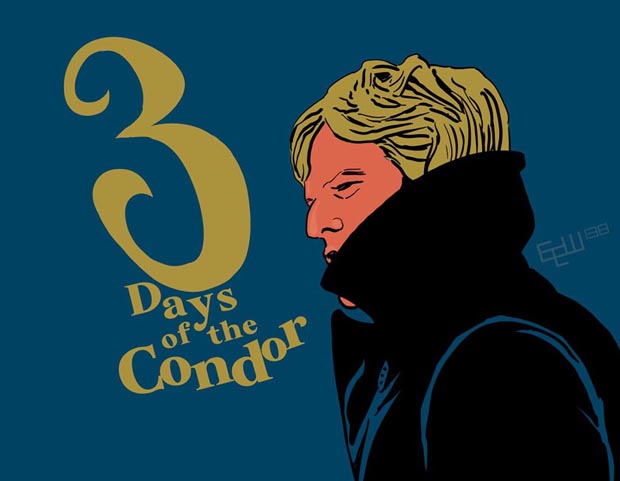LAST UPDATE Feb 17, 2026
Reviews of Classic Film, with artwork and news
Robert Duvall 1931 – 2026
"Chameleon of the silver screen"
Story at Washington Post
Adam Sandler, Alec Baldwin and Jamie Lee Curtis remember 'One of the Greatest Actors'
Story at Yahoo News
Robert Duvall's ties to Texas' films
Story at TPR News
"Mourning one of the greats"
Story at Yahoo
Robert Duvall's final video message to his fans
Story at MSN People
Duvall's unique role in a bizarre Depression-Era tale from East Tennessee
Story at WATE Knoxville
Frederick Wiseman 1930-2026 "dean of documentary filmmaking" has died – Washington Post
In an era of shrinking attention spans, Mr. Wiseman’s movies were defiantly long and slow-moving, frequently lasting three hours and — in the case of “Near Death” (1989), shot at an intensive care unit in Boston’s Beth Israel Hospital — sometimes stretching to six..."

Seen at the local Barnes and Noble, Feb 2026
Three Girls About Town (1941)
Joan Blondell and John Howard have an argumentative on-then-off then-on-again relationship as they deal with problems that keep cropping at a huge hotel they desperately want to protect from scandal. In between drunken conventioneers filling the huge building, an unexplained dead body shows up in the middle of a Mortician's convention, and then on top of that Blondell's character's little sister (played by Janet Blair in her first film role) shows up having left her all-girl's school in a boy-mad state looking for male attention. She arrives and throws her sights on John Howard's humble newspaper reporter which tangles up his relationship with Blondell's character even more.
More about Three Girl's About Town 1941
On Blu Ray: The Gay Divorcee - Ginger Rogers and Fred Astaire – Amazon
Spencer Tracy 4-Film Collection Blu Ray set comes Feb 17, 2026
- Fury 1936 - Dir. Fritz Lang
- Libeled Lady 1936 - w/Jean Harlow, Wm. Powell and Myrna Loy
- Northwest Passage 1940 - Dir. King Vidor
- Bad Day at Black Rock 1955 - Dir. John Sturges
Warner Archives Facebook announcement
Producer Kenneth Hyman has died at the age of 97 – MSN Hollywood Reporter
Hyman produced a long roster of famous films, such as: Whatever Happened to Baby Jane?, The Dirty Dozen, The Hill, Camelot, The Wild Bunch, among others.
4K Blu Ray coming for 1930 Hell's Angels wth Jean Harlow "in her bombshell breakthrough" – Criterion
New 4K digital restoration of the Magnascope road-show version of the film, with uncompressed monaural soundtrack..."
The 1952 Narrow Margin (with Marie Windsor and Charles McGraw) comes out Jan 27th on Blu Ray – Amazon
The Kay Francis, Herbert Marshall and Miriam Hopkins Trouble in Paradise directed by Ernst Lubitsch coming to Blu Ray/4K April 14 – Criterion
Kino has a up to half-off "Box Set" sale until January 26, Monday – Kino Lorber
Flicker Alley to release disk of Focus on Louise Brooks – Flicker Alley
Disk includes The Street of Forgotten Men and fragment material from Now We're In The Air, Just Another Blonde, and American Venus. Also has commentaries, "Looking at Lulu" featurette and other extra material.
CEO of Paul Newman's "Painted Turtle" children's charity was caught embezzling $5.2 million – NY Daily News

Brigitte Bardot has died
Born in Paris on September 28, 1934
"Brigitte Bardot, French femme fatale and cultural phenomenon, dies at 91" – Washington Post
Hollywood had voluptuous but fragile Marilyn Monroe, and Italy had earthy but dignified Sophia Loren, but Ms. Bardot’s unapologetic hedonism made her a singular phenomenon. One of the most photographed women in the world, she triggered a million fantasies and think pieces. In an Esquire essay, Simone de Beauvoir found existential meaning in Ms. Bardot’s physical allure and dubbed her a "locomotive of women’s history."
...Over the years, Ms. Bardot aggressively downplayed her looks. As an older woman, she shunned makeup and often barely managed to pull her graying hair into a bun. Slowed by arthritis, she became increasingly reclusive. Her means of communication with the outside world became a fax machine..."
"Brigitte Bardot, French screen legend, dies aged 91" – UK The Times
Bardot devoted the latter part of her life to her animal rescue charity, but she was also a controversial figure..."
The death of the legendary "Babe" of French cinema – Kathimerini [Greek]
Despite her influence, Bardot found the life of a celebrity isolating. She often spoke of being a prisoner of her own fame, unable to enjoy the simple joys of life. "No one can imagine how horrible it was, such an ordeal," she reflected decades later. "I couldn’t go on living like that."
"Global grief: Brigitte Bardot dies at age 91" – Iefimerida [Greek]
Announcement of her death came from the The Brigitte Bardot Foundation
Question: Is the 'mad as hell' speech by Peter Finch from the 1976 Network written by Paddy Chayefsky kind of a parody or "heightened" revision of the Robert Riskin penned speech by "John Doe" (Gary Cooper) in Capra's 1941 Meet John Doe? And doesn't the situation of a media "puppet" controlled by powerful forces (or not controlled) link the films together?

William Powell & Myrna Loy I Love You Again on Blu Ray from Warner Archives – Amazon
Fast Review
Grand Exit - 1935: It sure is nice to be wanted, and that is the premise of this film. Thomas Ignatius “Tom” Fletcher (Edmund Lowe), an arson investigator, is desperately asked to return to his former employer, the Interoceanic Fire Insurance Company—the same company that had laid him off after he approved payouts on several expensive properties that burned. At the time, Fletcher was blamed for failing to find some mitigating circumstance that might have saved the company money.
More Grand Exit, 1935
Laurel and Hardy - The Restored Features, Volume 1 released – Classicflix
Pardon Us (1931) and Pack Up Your Troubles (1932)
BONUS FEATURES: Opening title sequence of the preview version of Pardon Us (which had the working title of Their First Mistake) featuring the "talking titles" with the Crane twins; Never-before-seen alternate ending for Pardon Us (no audio); Pardon Us alternate audio track without incidental music
Review
Miracle on 34th Street (1947) – If you're willing to believe in Santa Clause, this film has a story for you. And if you're not? Well, it's got an angle on that, too.
Maureen O'Hara plays Doris Walker, a senior manager at the huge Macy's department store in New York City. She's a single parent with a young daughter (played by 8 year old Natalie Wood) who, as the Macy's annual Christmas parade begins to assemble for the march through NYC, she suddenly needs to replace their very inebriated Santa Clause for the store's float. An unhappy Edmund Gwen is right there with her because he has already complained to the Macy's employees that their Santa was drunk and "a disgrace." Doris takes one look at Gwen's nicely groomed white beard and impish, elfish face and makes a panicked offer: will you replace our drunken Santa? Gwen is delighted to put on the suit.
What seems like a happy miracle of coincidence soon becomes complicated. This new Santa has not only made a good impression on the crowds in the streets, but after he is asked to play their store Santa inside the sprawling empire of the multi-story Macy's department store, long lines of kids and parents find this old gentleman a perfect incarnation of Kris Kringle. What's the problem? Maureen O'Hara's character discovers their new Santa Clause thinks he is Kris Kringle.
Fearing she might have a madman on her hands, Doris investigates and learns that Kris comes from an asylum that took care of old people. The institution's physician (James Seay) assures them, Kris's delusion is harmless and is only an expression of his desire to be helpful and kind. Maureen's character is afraid of what might happen if the delusion is challenged, but she's also afraid of what will happen if they try to replace this very popular Santa Clause. The solution is to just keep a close eye on him, and in the scheme to do so, she arranges for Kris to come live downtown at the home of senior store manager Julian Shellhammer (Philip Tonge), but before this gets accomplished Kris has already been offered a place at the home of Doris's earnest, want-to-be boyfriend Fred Gailey (John Payne) who lives in Doris Walker's own apartment building.
Now, not only is Kris at the store, but he's just a few doors away when off-duty. He is soon spending time with Doris' daughter and Kris learns little Susan Walker is being raised with a parental attitude of complete honesty at all times and the complete exclusion of any forms of phantasy. Kris begins amending this by teaching Susan how to imagine being an animal from the zoo, for example, a monkey, such as comically scratching and saying "ook, ook" as they pretend to drag around their extra-long arms.
Meanwhile, Fred Gailey is trying to overcome the refusal of the mother to respond to his amorous interest, and with a little prodding discovers a rich vein of bitterness from the past that hints at a painful and traumatic experience about Doris's daughter's father. Now that he knows what he is up against, a cheerful Fred gets to work, and with Kris teaching the daughter how to be a kid, the pair each have clear cut missions in mind. But then a major problem develops at the store involving the official psychiatrist at Macy's who takes a very dim view of this Santa Clause delusion...
A sharp script (by George Seaton and Valentine Davies) sometimes has enough Frank Capra-Robert Riskin flavor to it to make you wonder if that pair ghosted some of the story. There's also a reworked A Christmas Carole flowing around the character of the angry and wounded Doris Walker who needs a little help toward redeeming her future. Kris isn't a time-shifting angel like the spirits in the Dicken's tale, but when his certainty that he is Santa Clause blossoms into a court case hearing in which he could be "put away" at Bellevue, Doris has got to choose which side she is on. Erstwhile boyfriend Fred, who fortunately is an attorney, only see's one way out of the mess and that's to prove Kris really is Santa Clause.
Miracle on 34th Street has long been a staple of holiday TV programming, and the care taken in making the film reflects the access the production had to actual Macy's stores, but the original packaging of the movie didn't emphasize Christmas at all. The parade scenes were actual real parades (sometimes filmed using hidden cameras) that the production recorded during the 1946 Christmas season. Natalie Wood later said she thought Ed Gwenn's Santa Clause (he grew his beard out for the role) was "the real Santa" during filming.
Despite the obvious seasonal nature of the story, head of Twentieth Century Fox, Darryl Zanuck, was convinced the film would do better with a May-June release, so this quintessential December movie was actually put into theaters in early summer. Zanuck was certain the relatively low cost on the movie had more potential for box office in the months when attendance at theatres was highest, and it paid off: the earnings were four times production cost. Marketing at the time down played the Christmas connection and played up the Maureen O'Hara - John Payne romance, and Ed Gwenn was miniaturized on the posters.
Miracle on 34th Street went on to get three Oscars: Best Supporting Actor for Ed Gwenn; Best Screenplay and Best Original Story wins for the film's director George Seaton.
The Criterion Feb 2026 releases on disk
Network 1976 - 4K and Blu Ray HD disks. Directed by Sidney Lumet "from a brilliantly incisive script by Paddy Chayefsky" - Criterion Page
Lubitsch Musicals 4-film box set – The Love Parade (1929) with Maurice Chevalier and Jeanette MacDonald; Monte Carlo (1930) with Jeanette MacDonald; The Smiling Lieutenant (1931) with Maurice Chevalier, Claudette Colbert and Miriam Hopkins; One Hour with You (1932) With Maurice Chevalier and Jeanette MacDonald. 2 Disk Blu Ray set. - Criterion page
3:10 to Yuma 1957 - 4K, Blu Ray and DVD. Classic western from a story by Elmore Leonard. Starring Glenn Ford and Van Heflin. Criterion Page
Captain Blood 1935 - 4K, Blu Ray and DVD. Erroll Flynn stars with a "groundbreaking symphonic score by Erich Wolfgang Korngold." – Criterion Page

Review
Review:
Island of Desire – 1951: A flawed movie with very nice color photography and an occasional witty moment from the script:
Linda Darnell: Dugan, I really wanted to help, but I was terrified. You've never been afraid, have you?
Tab Hunter: Sister, the only thing that scares the tar out of me is you.
An island melodrama somewhat in the vein of The Blue Lagoon featuring Tab Hunter as a U.S. marine and Linda Darnell a skilled veteran combat nurse who get marooned together in the South Pacific. More about Island of Desire, 1951
Review:
Road to Morocco – 1942: On the road again with Bob Hope, Dorothy Lamour and Bing Crosby trying to handle a sand-and-sandals tale which won't stay within the lines of an "exotic adventure" from Hollywood but keeps stopping to let the performers, especially Bob Hope, to talk to the audience directly. Often considered the best of the seven "Road" pictures made by the trio, the film also features Anthony Quinn and Dona Drake - more about Road to Morocco – 1942
Review:
Actors and Sin – 1952: This mini-anthology diptych written, directed and produced by Ben Hecht is about the business-end of the acting and the producing arts, two tales split in opposite extremes, each like the ancient "Thalia and Melpomene" masks of drama in which one is laughing and the other is crying, something that pictures the two stories Hecht has put together here. "a lovely piece of old-fashioned mummery."
More about Actors and Sin, 1952
Criterion classic film releases just ahead
1930 Hell's Angels with Jean Harlow - 4K release – Criterion Coming November 18
1940 His Girl Friday in 4K with Rosiland Russell and Cary Grant – Criterion Coming December 2
4K Captain Blood with Erroll Flynn – Criterion Coming January 20, 2026
The "living Caryatid" Irene Papas
The "living Caryatid" Irene Papas film retrospective at the Greek Film Archive in Athens
Story at Lifo [in Greek - English vis Google Translate]
Review:
Ladies Man – 1931: Early "talkie" with a primitive handling of audio and especially the pacing of dialogue but Carol Lombard, kay Francis and a youngish William Powell make it work toward the tragic ending. More about Ladies Man, 1931
Review:
Funny Girl – 1968: This film is half of a very, very good musical about early 20th century songstress and comedienne Fanny Brice with Omar Sharif and Barbra Striesand – more about Funny Girl.

Claudia Cardinale has died - 1938–2025
"Acclaimed Italian actor Claudia Cardinale, who starred in some of the most celebrated European films of the 1960s and 1970s, has died, AFP reported Tuesday. She was 87." – Associated Press - New York Post
"Claudia Cardinale, star of ‘8½’ and ‘The Leopard,’ dies at 87" – MSN CNN News
"The rebellious diva of Italian cinema" – La Repubblica [Italian]
From her first film Big Deal on Madonna Street by Mario Monicelli to her latest works with young directors, Claudia Cardinale made more than 150 films. Thus, ‘the girl who didn’t want to go into cinema’ became an icon of Italian identity thanks to collaborations with the greatest Italian directors, from Visconti to Fellini, from Comencini to Ferreri, from Leone to Blake Edwards. She also worked for Hollywood, though she fled from it. The list of awards is long as well: from the David di Donatello prizes for Girl with a Suitcase by Valerio Zurlini and The Day of the Owl by Damiano Damiani to the Silver Ribbons, from the Golden Bear for Lifetime Achievement at the Berlin Festival in 2002 to the Golden Lion for Lifetime Achievement at the Venice Festival in 1993..."
"A symbol of Mediterranean beauty and a beloved actress for directors such as Visconti, Fellini, Leone, and Herzog" – La Stampa [Italian]
Review:
There's Always A Woman - 1938: Melvyn Douglas and Joan Blondell are a husband-wife team working from opposite sides on a murder mystery - More about There's Always A Woman

Robert Redford has died - 1936–2025
"Elusive legend of the big screen" – UK The Times
When the success of Butch Cassidy and the Sundance Kid elevated him from promising leading man to bona fide movie star status, Robert Redford did not celebrate. Rather, he sat down and wrote a list of the three key danger points of his newly minted celebrity.... It was a curiously wary response from an actor who had spent the film shoot terrifying the rest of the cast and crew by insisting that he did his own stunts ... Physically daring but intellectually cautious, he was deeply suspicious of Hollywood and its trappings, by nature distrustful of movie industry exuberance. He was — crucially — a very private person, who kept even his closest collaborators at arm’s length. The screenwriter William Goldman recalled that even on their third film together, All the President’s Men, Redford was still too cagey to give out his home phone number."
A movie star and founder of Sundance – Washington Post
Mr. Redford remained essentially a loner who craved the solitude of his wilderness home in Utah and pushed 120 mph on the open highway in his Porsche..."
Virginia USA based Elder Care for bill payment, case management, prescriptions, tax records or support for caregivers - AllStar Care Solutions
Belief-Code, Body Code and T3 Therapy? See sacred-connection.com


